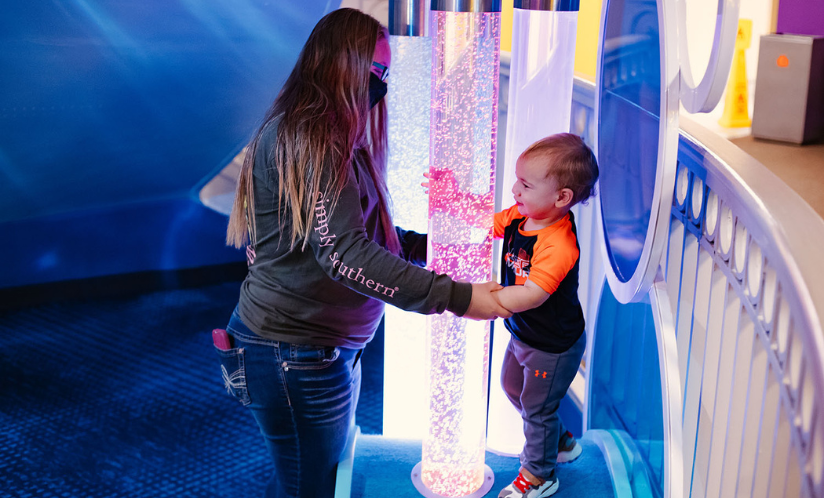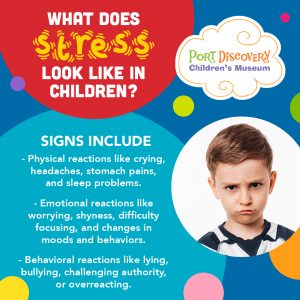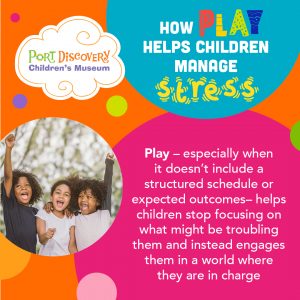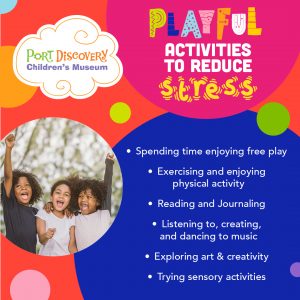
As adults, we’re all too familiar with stress – and the many, many ways it can affect our lives. But did you know that children experience stress, too?
Although we wish childhood was stress and carefree, the fact is that children can experience stress and anxiety from disruptions in routines, from changes in their home or family, from school or homework, from friends and social situations, and more.
Helping children understand those feelings, manage them, and work through them – as well as finding ways to help children relieve stress – is important to helping them succeed in school and life!
What Does Stress Look Like in Children?

Wondering if your child is experiencing stress or anxiety? Here are some signs that experts in early childhood suggest looking out for, keeping in mind that your child’s age and other factors may impact their reactions to stress.
- Physical Reactions: According to experts at Pennsylvania State University, children may cry or experience headaches in response to stress. Stomach pains and sleep problems are also signs to look out for.
- Emotional Reactions: Experts also share that worrying and shyness may be responses to stress. Other reactions include difficulty focusing, changes in mood or behavior, bedwetting or trouble sleeping
- Other signs and symptoms to look out for: Experts from Nemoursshare that other signs of stress in children might include new habits like hair twirling or thumb sucking, behavioral reactions like lying, bullying, challenging authority, or overreacting.
If you’re seeing signs that concern you, try talking to your child, their teachers, and healthcare professionals. Let your children know that you understand their feelings and emotions and that you’re there to help them and support them. In addition, talk to your child’s healthcare provider about what steps you might be able to take to help your child manage their stress and anxiety.
How Play Helps Children Reduce & Manage Stress

Play – especially when it doesn’t include a structured schedule or expected outcomes – help children stop focusing on what might be troubling them and instead engages them in a world where they are in charge. Play also helps children feel like they are in control as they get to create worlds all of their own, express themselves, problem-solve, and connect with and build emotional bonds with others.
As kids play, they are flexing their creative muscles, getting active, and also developing emotionally as they figure out how things work. Through play, children are also relieving stress – and learning important coping skills that can help them react to stressful situations they may face in the future.
6 Playful Activities to Reduce Stress

Looking for playful activities that can help your little ones reduce and manage stress?
- Encourage your child to play – without any schedules or expected outcomes. Making regular time for free play where your child can use their imaginations and creativity without any specific outcome is a great way to help children reduce and deal with stress. To help your child get started, consider giving them a few options to pick from. For instance, set out costumes, blocks, and stuffed animals – and see what they can dream up and do! Visiting places that are designed for children to enjoy free play – like Port Discovery – is another way to make time for free play, too!
- Exercise: A great activity to help children (and adults) with stress is physical activity and active play. Time spent running outside, playing a sport, or practicing a short parent and child yoga session together can help children get active and expend some energy – and feel more relaxed. Check out this Movement Challenge from Port Discovery’s Play Experts for one activity to try!
- Reading and Journaling: Experts at Nemours remind us that reading books about characters in stressful situations – and understanding and talking about how the characters respond and cope – can help children understand that they’re not alone, and also help them develop coping skills all their own. Journaling thoughts and feelings and drawing pictures can also be a useful tool to help children playfully explore what they are feeling. Explore some suggested books to help kids cope with stress – and check out this helpful How-To DIY Journal Making activity from Port Discovery!
- Music: Listening, dancing, exercising and creating music can also be a fun and playful way for children to relax and cope with stress. Experiment with music and movement to see what your child might enjoy and respond to. Explore a variety of At-Home Music & Movement ideas from Port Discovery’s Play Experts!
- Art: For little ones, creative play is not only fun – but it also encourages children to be creative, express themselves without judgment, and explore through various art forms. Time spent playing and creating with art can also help children relax and get relief from stress they may be feeling. Explore a variety of Art activities to try in the Port Discovery Play At Home library!
- Sensory Activities: Sensory items and activities like playing with a squishy stress ball, squeezing Play-Doh®, or playing with kinetic sand can have calming effects on children. While you help your little one stimulate senses like touch, movement, and more, you’ll also be helping them stay calm, regulate their emotions, and reduce stress. Try out these Sensory Activity Ideas from The Chaos and The Clutter.